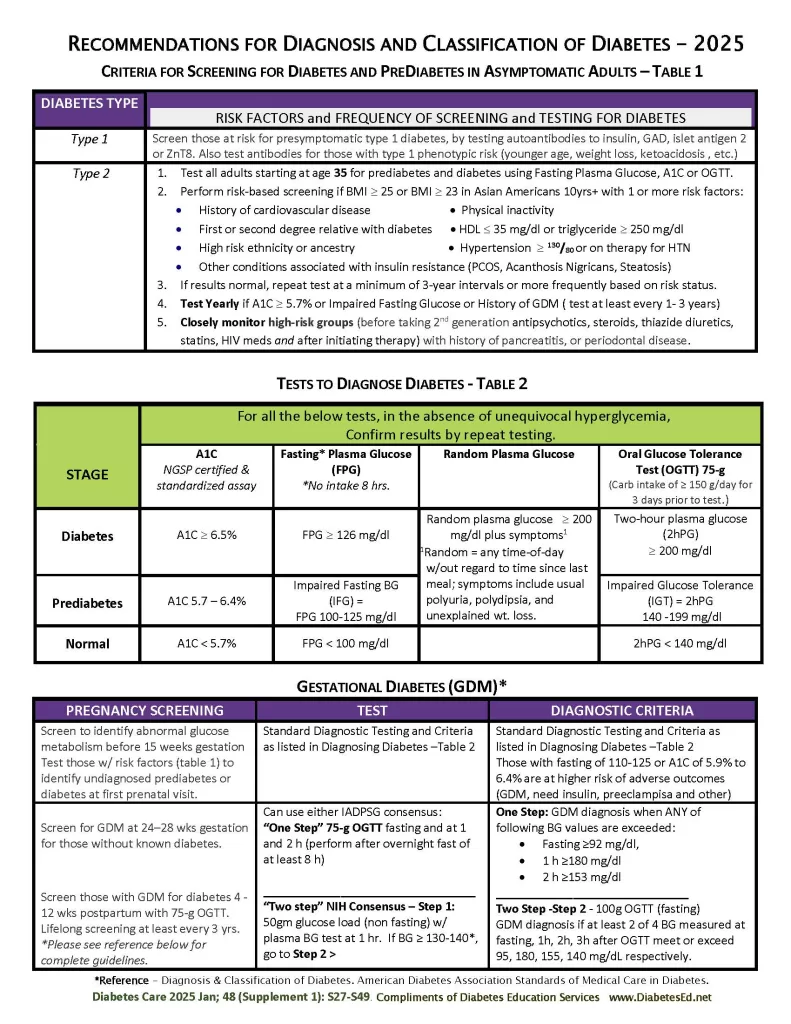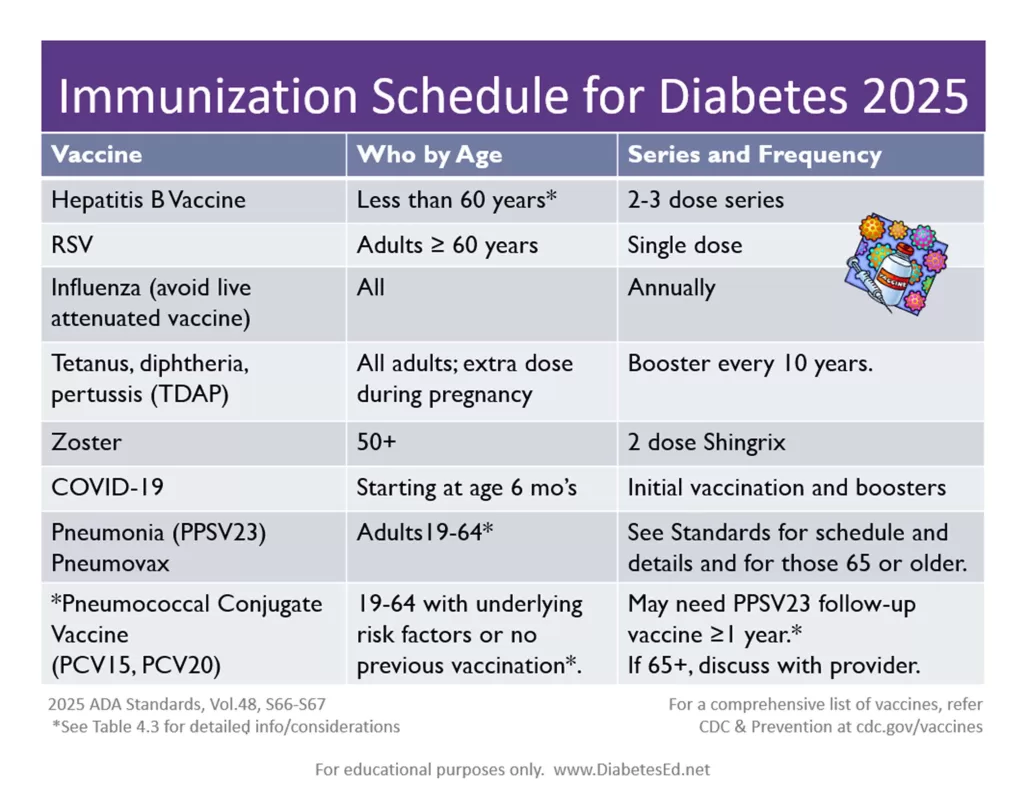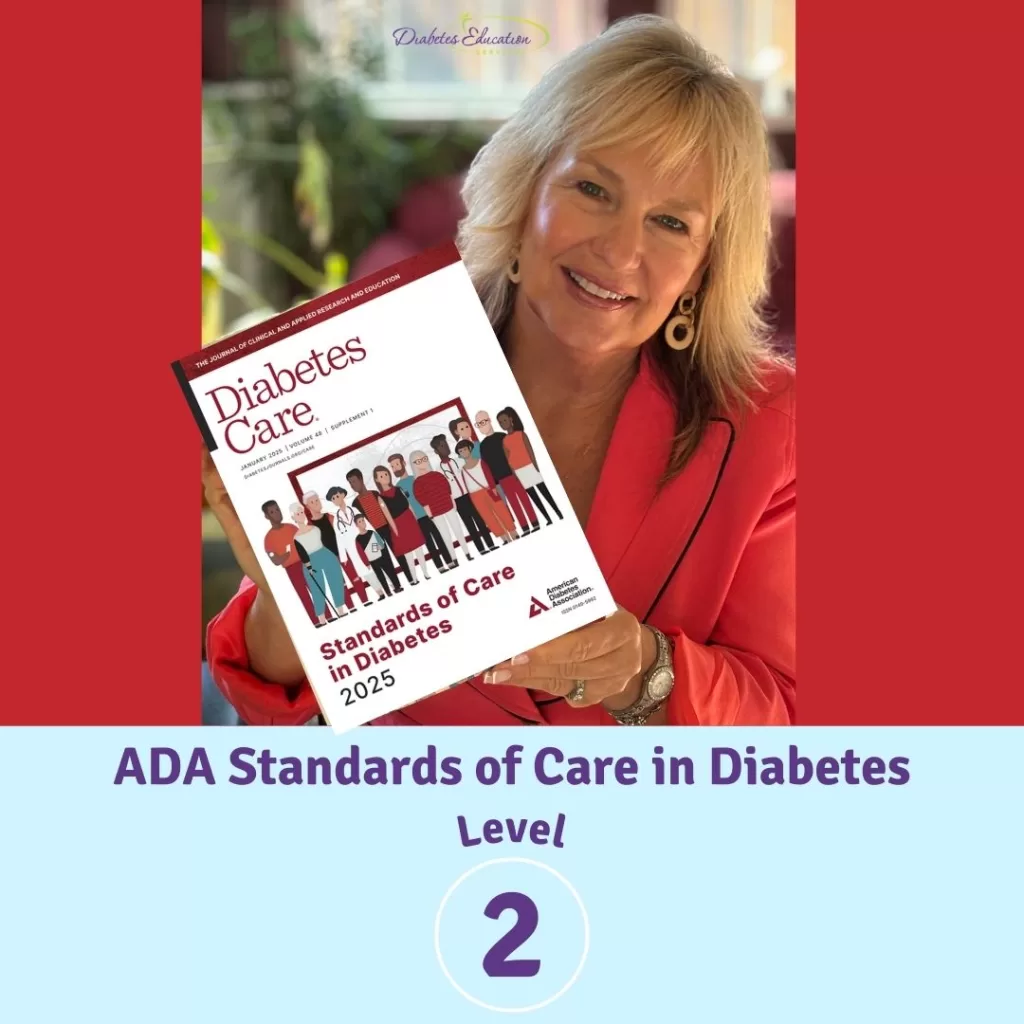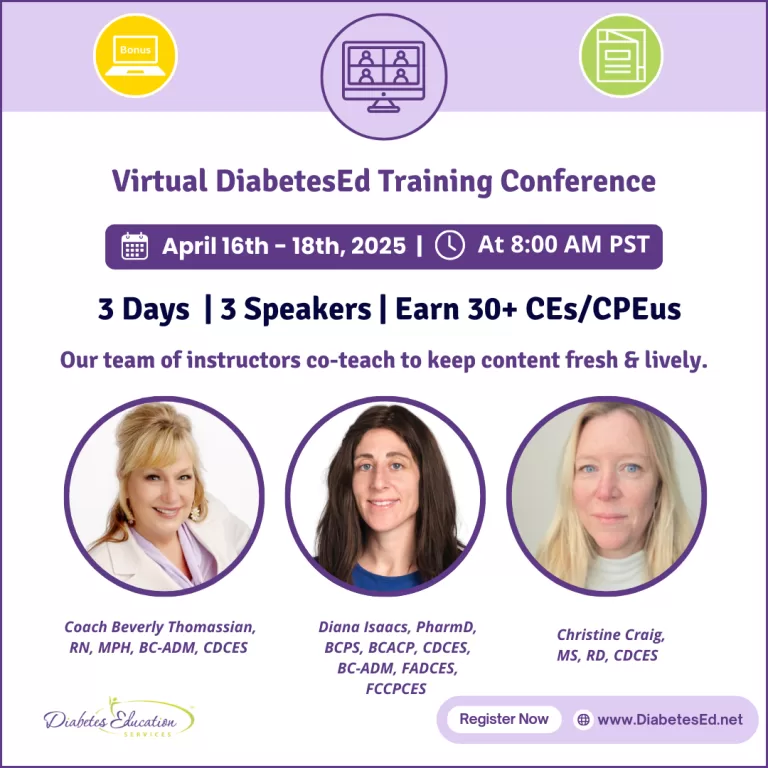
Ready to get certified?
Free CDCES Coach App

Subscribe
eNewsletter
Download
Free Med Pocket Cards
Cheat Sheet Updates – Reflect 2025 ADA Standards
At the beginning of each year, Coach Beverly excitedly scans the new ADA Standards to discover updates and advances in diabetes care. She then integrates these new findings into our Cheat Sheets.
Notable updates include our at-a-glance Screening and Diagnosis of Diabetes, Immunization Schedule, Insulin Storage and Dispensing Information and our Lipids and Hypertension Medication Summary Sheet and more.
You can access the complete Cheat Sheet Library on our website and on our CDCES Coach App. We are proud of our 25-year history of creating original materials that to meet the rigorous standards set by the CDR Accreditation Committee and hope you find them useful in your clinical practice and in your preparation for certification exams.
Cheat Sheet Updates based on 2025 Standards
ADA Standards of Care 2, Diagnosis and Classification of Diabetes includes additional details on screening for type 1 and type 2 diabetes and diabetes in pregnancy. The diagnostic testing methods and criteria remained the same as in past years. However, the ADA notes that there is lower sensitivity of A1C at the designated cut point compared with that of 2-h PG as well as limited access in some parts of the world.
1.) Screen those at risk for presymptomatic type 1 diabetes and those with type 1 phenotypic risk (younger age, ketoacidosis, etc.) by testing autoantibodies to insulin, GAD, islet antigen 2, ZnT8
2.) For Type 2 diabetes, screen everyone starting at age 35, but screen people with prediabetes yearly and those with GDM every 1-3 years.
3.) Additional risk factors for earlier screening were added and a few were modified from last year. See new additions in bold. The ADA added monitoring for hyperglycemia in those taking high-risk medicines (steroids, HIV meds, antipsychotic meds, statins, thiazide diuretics ) or a history of pancreatitis or periodontal disease and re-checking glucose levels at least annually or if any signs of hyperglycemia.
4.) In the diabetes and pregnancy section, the ADA still strongly recommends screening all people at the first prenatal visit (before 15 weeks) to help detect undiscovered hyperglycemia and initiate early treatment.
The update for this Insulin Storage and Dispensing sheet is inspired by Tyler Whitaker, PharmD, BC-ADM, CDCES. Tyler reached out to let us know about needed additions, updates and changes to this content. He said he uses this information all the time in his clinical practice and he was happy to give back. I want to thank Tyler for helping us improve this resource and for his thoughtful review of earlier drafts and this final version. I appreciate being a part of this wonderful community of educators who are invested in supporting each other to succeed.
Updates to this Cheat Sheet include approval for Lyumjev in insulin pumps, removal of detemir insulin and clarification of the the 70/30 insulins’ shelf life, packaging and cost information.
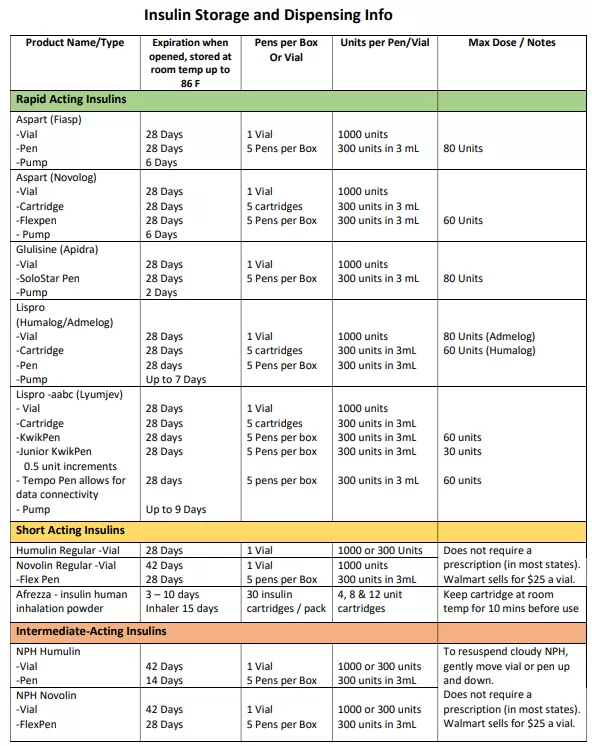
This chart, compiled based on ADA Standard 4, details the types of vaccines, when, and how often they are recommended for people with diabetes. The recommendations in general were very similar to last year. The COVID-19 vaccine and boosters are suggested starting at six months of age.
This standard emphasized reminding people with diabetes to avoid the live attenuated influenza vaccine and it included additional clarification on the pneumonia vaccines. For a comprehensive list of vaccines, refer to the Centers for Disease Control and Prevention web site at cdc.gov/vaccines/.
For the content included in these 5 pages, our resident expert pharmacist updated dosing ranges, considerations and added newer lipid lowering and blood pressure medications to this comprehensive list. A special shout out to our expert and my husband, Kristapor Thomassian, PharmD, BCPS, for his hours of review, edits and content negotiations with the company CEO and wife of 26 years.
If you are preparing for the CDCES exam, you will need to be familiar with the most common blood pressure and cholesterol medication classes and side effects along with when they are indicated based on the ADA Standards. For the BC-ADM exam, you will need to know the same information but in more detail, imagining you would be familiar enough with these medications to prescribe them or make need adjustments and additions.
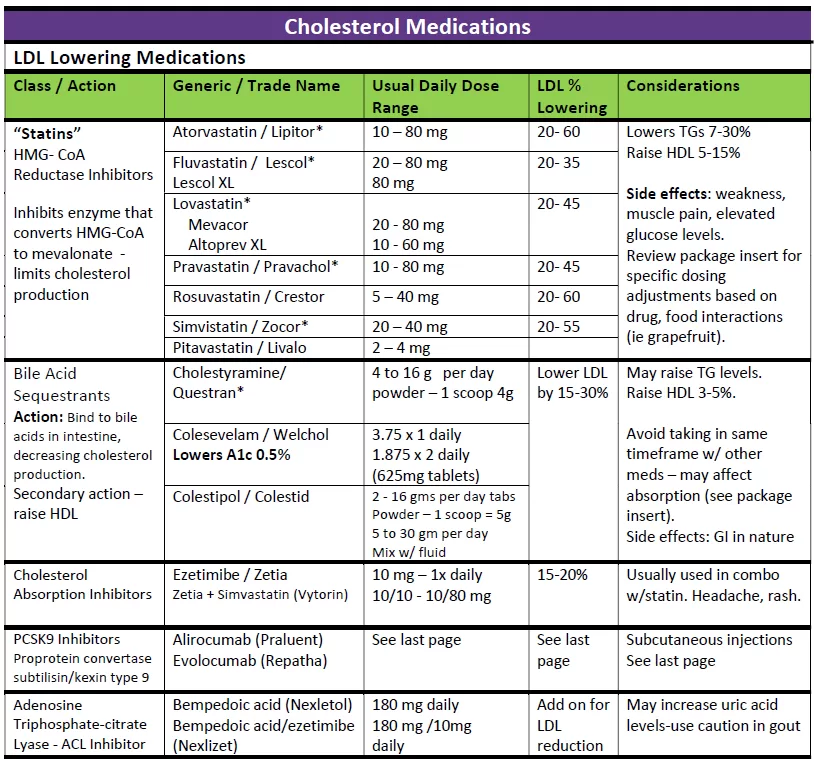
We hope you will stop by our complete Cheat Sheet Library!!
ADA Standards of Care 2025 Webinar Update
Join us live on Jan. 30th @ 11:30am PST
Our Level 2 Courses make learning the ADA Standards of Care easy and effective by breaking them down into bite-sized, essential topics for clinical practice and exam prep. You can follow the course order based on the Standards, or choose your own path, starting with what you know least and building from there.
This course is perfect for healthcare professionals looking to master the ADA Standards for better clinical practice or for those preparing for the BC-ADM or CDCES exams.
Each webinar focuses on key content, helping you make the most of your study time. Our instructor also uses polls to highlight important concepts, so you can test your knowledge and pick up the best exam strategies.
Sign up for Diabetes Blog Bytes – we post weekly Blog Bytes that are informative and FREE! Every week we post one exam practice Question of the Week and Rationale of the Week. Sign up below!
Recent Blog Bytes
- Rationale of the Week | Best Response for Facilitating Positive Health Behavior Change?
- Question of the Week | Which Feature Most Strongly Supports a Diagnosis of HHS Rather Than DKA?
- Rationale of the Week | What Does J.C.’s Family History & Lab Work Reveal?
- Red Flags for Low Digital Literacy in Diabetes Care
- Question of the Week | Best Response for Facilitating Positive Health Behavior Change?
The use of DES products does not guarantee the successful passage of the certification exam. CBDCE and ADCES do not endorse any preparatory or review materials for the CDCES or BC-ADM exams, except for those published by CBDCE & ADCES.
Question of the Week | ADA Standards identify another 1st Line med to treat kidney disease. Which one?

According to the ADA 2025 Standards, new clinical trials suggest that another diabetes medication (besides SGLT-2i) can be used as a first line agent to treat chronic kidney disease.
Which of the folowing diabetes meds is effective as a first-line agent for people with CKD?
- Afrezza inhaled insulin
- Semaglutize (Ozempic)
- Amylin (Pramlintide)
- Sitagliptin (Januvia)
Want to learn more about this question?
Join us live on January 30th @ 11:30am PST for our
Level 2 | Standards of Care Course
This course, updated annually, is an essential review for anyone in the field of diabetes. Join Coach Beverly as she summarizes the annual updates to the American Diabetes Association’s (ADA) Standard of Medical Care in Diabetes & provides critical teaching points & content for healthcare professionals involved in diabetes care & education.
All hours earned count toward your CDCES Accreditation Information
Sign up for Diabetes Blog Bytes – we post weekly Blog Bytes that are informative and FREE! Every week we post one exam practice Question of the Week and Rationale of the Week. Sign up below!
Recent Blog Bytes
- Rationale of the Week | Best Response for Facilitating Positive Health Behavior Change?
- Question of the Week | Which Feature Most Strongly Supports a Diagnosis of HHS Rather Than DKA?
- Rationale of the Week | What Does J.C.’s Family History & Lab Work Reveal?
- Red Flags for Low Digital Literacy in Diabetes Care
- Question of the Week | Best Response for Facilitating Positive Health Behavior Change?
The use of DES products does not guarantee the successful passage of the certification exam. CBDCE and ADCES do not endorse any preparatory or review materials for the CDCES or BC-ADM exams, except for those published by CBDCE & ADCES.
January 2025 E-Newsletter
At the beginning of each year, Coach Beverly excitedly scans the new ADA Standards to discover updates and advances in diabetes care. She then integrates these new findings into our courses and web content to ensure we accurately reflect the latest guidelines.
In our first newsletter of 2025, we are excited to share our library of annually reviewed Cheat Sheets that integrate the 2025 Standards! They are available on our website and CDCES Coach App for easy access, with the option to download and share with your colleagues and people living with diabetes alike.
We are thrilled to recognize a trailblazer in Northern California who is mentoring eight new diabetes care and education specialists. Janelle Revnak, MS, RDN, CDCES, realized that more educators were needed to meet the needs of her rural community and took action. Read more about her story and bold plan below.
Christine Craig, MS, RD, CDCES, highlights the importance of sleep in improving health and suggests actions that diabetes care and education specialists can take to address sleep health as a vital component of diabetes care.
Coach Beverly addresses commonly asked questions for those taking the CDCES Exam, including information on our practice hours tracker and which ADA Standards year to study.
We encourage you to test your knowledge with our Question and Rationale of the Week. January kicks off our Level 1 Fundamental Series, followed by our annual ADA Standards of Care update and Level 3 Mastery Course Series in February. We hope to see you there!
Here is to a 2025 filled with self-compassion and moments of awe.
Coach Beverly, Bryanna, Tiffany, and Christine
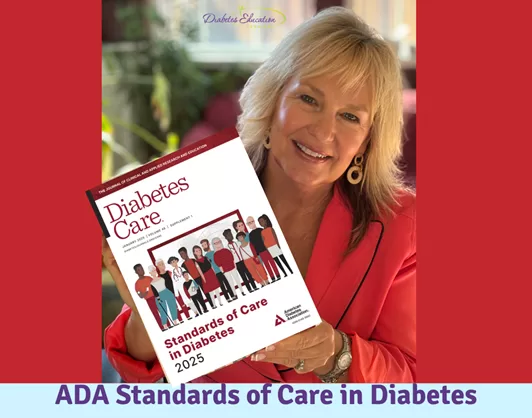
Announcements ___________________________ |
Sign up for Diabetes Blog Bytes – we post weekly Blog Bytes that are informative and FREE! Every week we post one exam practice Question of the Week and Rationale of the Week. Sign up below!
Recent Blog Bytes
- Rationale of the Week | Best Response for Facilitating Positive Health Behavior Change?
- Question of the Week | Which Feature Most Strongly Supports a Diagnosis of HHS Rather Than DKA?
- Rationale of the Week | What Does J.C.’s Family History & Lab Work Reveal?
- Red Flags for Low Digital Literacy in Diabetes Care
- Question of the Week | Best Response for Facilitating Positive Health Behavior Change?
The use of DES products does not guarantee the successful passage of the certification exam. CBDCE and ADCES do not endorse any preparatory or review materials for the CDCES or BC-ADM exams, except for those published by CBDCE & ADCES.
Question of the Week | Diabetes and Malnutrition Risk

The 2025 ADA Standards of Care have added recommendations for malnutrition screening.
According to these updated standards, who could be at risk for malnutrition?
- An individual with a BMI of 38 and 21% weight loss in the past 6 months.
- An individual on incretin therapy with intentional 18-pound weight loss in the past 2 months.
- An 86-year-old with type 1 diabetes and reported recent decline in activity and strength.
- All the above
Want to learn more about this question?
Join us live on Jan. 30th for our
2025 Standards of Care
Level 2
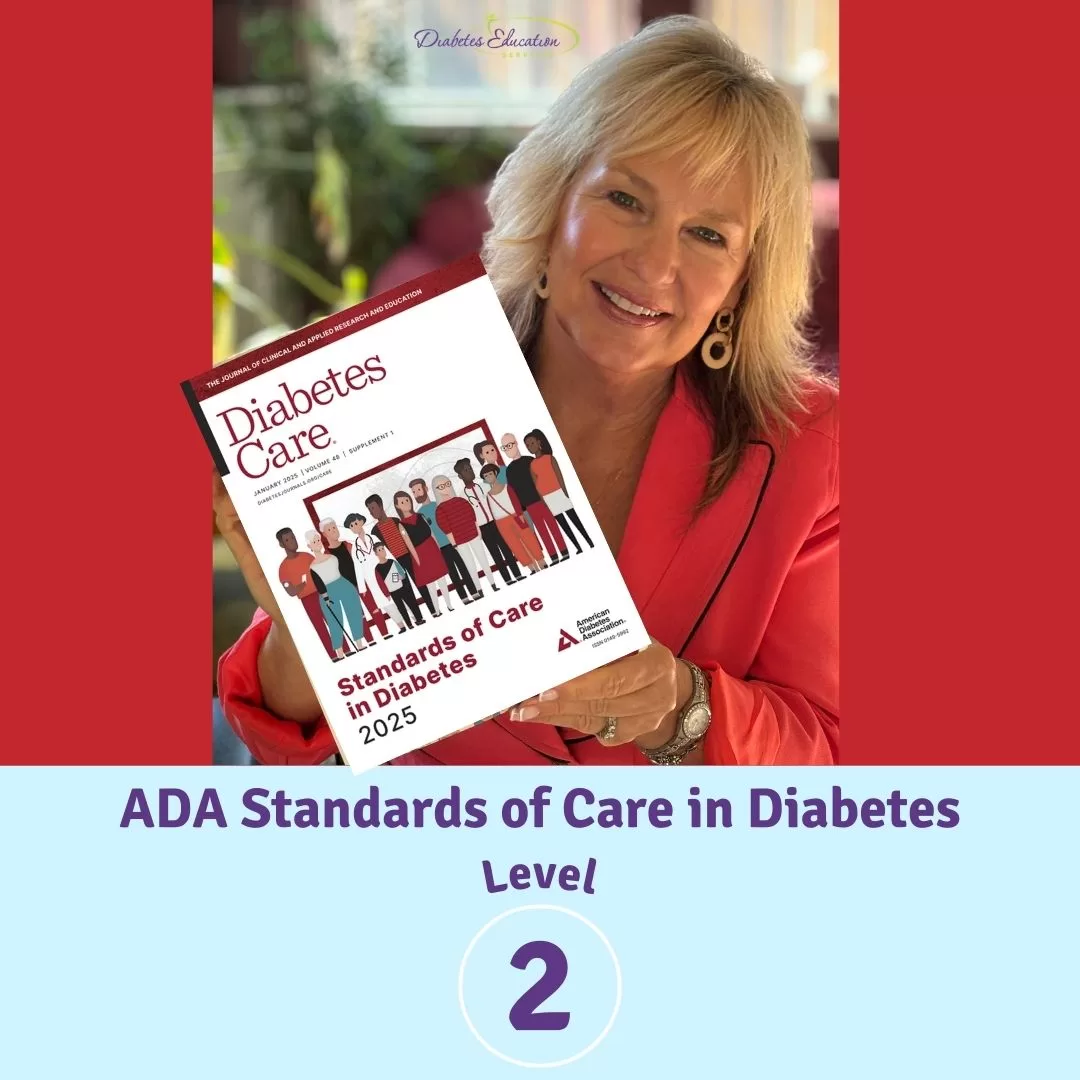
This course, updated annually, is an essential review for anyone in the field of diabetes. Join Coach Beverly as she summarizes the annual updates to the American Diabetes Association’s (ADA) Standard of Medical Care in Diabetes & provides critical teaching points & content for healthcare professionals involved in diabetes care & education.
All hours earned count toward your CDCES Accreditation Information
Sign up for Diabetes Blog Bytes – we post weekly Blog Bytes that are informative and FREE! Every week we post one exam practice Question of the Week and Rationale of the Week. Sign up below!
Recent Blog Bytes
- Rationale of the Week | Best Response for Facilitating Positive Health Behavior Change?
- Question of the Week | Which Feature Most Strongly Supports a Diagnosis of HHS Rather Than DKA?
- Rationale of the Week | What Does J.C.’s Family History & Lab Work Reveal?
- Red Flags for Low Digital Literacy in Diabetes Care
- Question of the Week | Best Response for Facilitating Positive Health Behavior Change?
The use of DES products does not guarantee the successful passage of the certification exam. CBDCE and ADCES do not endorse any preparatory or review materials for the CDCES or BC-ADM exams, except for those published by CBDCE & ADCES.
Bold Front-of-Food Labeling Proposal

Clarifying “Healthy” on Food Labels
To address nutrition’s role in chronic disease, the FDA proposes a bold new front-of-package nutrition labeling law aimed at helping consumers make healthier food choices.
The proposed nutrition label is intended to complement the nutrition facts label and would categorize saturated fat, sodium, and added sugars as low, medium, or high. This proposal comes on the heels of the December 2024 definition update of the nutrition claim “healthy.”
To be labeled as “healthy”, products must contain fruit, vegetables, protein, dairy, or grains and meet certain nutrient limits. As diabetes care and education specialists, it is essential to be aware of this FDA initiative, since it aligns with the 2025 ADA Standards of Care nutrition therapy recommendations3 and global efforts to address diet-related health issues.
Front-of -Package Food Labeling decreased High Sugar Purchases
In Fall 2023, my family and I spent five months in Chile, offering a firsthand view of the impact of front-of package policies on the grocery landscape. Similar to global trends, over the past twenty years, Chilean diet patterns have shifted toward packaged and fast-food consumption.
Recognizing the connection between diet and chronic disease, Chile implemented ambitious food policies. Key measures included increased taxation on sugar-sweetened beverages, front-of-package warning labels, restrictions on child-targeted food marketing, and bans on unhealthy food sales in schools.4 In 2016, Chile became the first country to require front-of-package warning labels for foods high in calories, saturated fat, added sugars, and sodium. Outcomes from these measures significantly reduced purchases of sugar-sweetened beverages by nearly 24% within two years and reduced overall purchases of “high in sugar” food and beverage-labeled foods.4 Countries throughout South America, Israel, and Canada have followed suit with required front-of-package warning or stop light labeling.5 They have all shown improved consumer awareness and changes to diet intake, which has also influenced manufacturers’ food reformulation.
Unintended Consequences – More Non-Caloric Sweeteners
Despite the progress in Chile’s nutrition policy efforts, unintended consequences emerged. To avoid warning labels, food companies reformulated products, especially those “high in sugar.” By 2020, Chile’s total percentage of non-caloric sweeteners increased to be within over 50% of all products.6
The FDA is encouraged that its’ proposed front-of-package nutrition labeling system will encourage product reformulation to align with new policies.2 While reformulations can be beneficial, they also raise concerns about continued reliance on low nutrient-density processed food consumption and additives such as non-nutritive sweeteners, which the World Health Organization and the American Diabetes Association discourage.3
It will be important to monitor behavioral purchasing changes along with the long-term health benefits or implications of reformulated products to ensure U.S. new labeling guidance actually achieve healthier dietary patterns.
Advocate for Whole Food-Based Eating Patterns
As we embark on a new era of food and chronic care policy efforts, diabetes educators can learn from other countries’ successes and challenges while advocating for policies that foster healthier dietary and socioeconomic environments. Where appropriate, we can encourage a shift toward whole food-based eating patterns and reduced reliance on processed food consumption. We can stay abreast and advocate for policy and action alerts impacting nutrition and diabetes care.
By complementing front-of-package labeling proposals with educational campaigns, community-level interventions, and policies that address quality food access, we can improve population health and address the root causes of health disparities.

Learn More:
Get Involved in Advocacy:
- American Diabetes Association Advocacy Overview
- Association of Diabetes Care and Education Specialists Advocacy
- American Dietetic Association Advocacy
References:
- CDC: Diabetes. Download on January 18th, 2025 from https://www.cdc.gov/diabetes/communication-resources/1-in-3-americans.html
- Food Labeling: Front-of-Package Nutrition Information (Proposed Rule). Downloaded on January 19th 2025 from Source.
- American Diabetes Association Professional Practice Committee; 5. Facilitating Positive Health Behaviors and Well-being to Improve Health Outcomes: Standards of Care in Diabetes—2024. Diabetes Care1 January 2024; 47 (Supplement_1): S77–S110. https://doi.org/10.2337/dc24-S005
- Taillie LS, Reyes M, Colchero MA, Popkin B, Corvalán C. An evaluation of Chile’s Law of Food Labeling and Advertising on sugar-sweetened beverage purchases from 2015 to 2017: A before-and-after study. PLoS Med. 2020 Feb 11;17(2):e1003015.
- Front-of-package labeling. Downloaded on 1/18/2025 from https://www.globalfoodresearchprogram.org/resource/front-of-package-label-maps/
- Sambra V, López-Arana S, Cáceres P, Abrigo K, Collinao J, Espinoza A, Valenzuela S, Carvajal B, Prado G, Peralta R, Gotteland M. Overuse of Non-caloric Sweeteners in Foods and Beverages in Chile: A Threat to Consumers’ Free Choice? Front Nutr. 2020 Jun 17;7:68
Upcoming Courses You Won’t Want to Miss!
Join us this January for 2025 Level 1 courses! This bundle is specifically designed for healthcare professionals who want to learn more about diabetes fundamentals for their clinical practice or for those who are studying for the Certified Diabetes Care and Education Specialist (CDCES) exam.
In each webinar, our instructors highlight the critical content of each topic area so you can focus your study time most efficiently. They also launches multiple poll questions that highlight key concepts to help students assess their knowledge and learn the best test-taking strategies.
Each individual online course includes a: video presentation, podcast, practice test, and additional resources. After purchase, you have immediate access to your courses for 1 full year. Download Level 1 Flyer here for schedule.
You are invited to join Coach Beverly for this FREE Webinar Jan. 13th, 2025 @ 11:30am PST. In this webinar, Beverly will take you through 20 sample questions from our Test Taking Toolkit, explaining the answers and the rationale behind each one.
Enrolling is simple! Register for free and get 20 sample questions with rationales, or gain instant access to 200+ practice questions by purchasing our Test Taking Toolkit for $49. Take advantage of this affordable and comprehensive preparation tool and get one step closer to exam success! Don’t leave your success to chance – prepare with this FREE webinar and be ready to tackle your exam with confidence.
We hope to see you there.
As diabetes technology is becoming commonplace in our practice, figuring out how to make sense of all the data can seem overwhelming. Join Diana Issacs and Coach Beverly for a truly unique learning experience.
Dr. Isaacs has a special knack for breaking down the essential elements of the Ambulatory Glucose Profile (AGP) report to provide participants with a clear road map for data interpretation. She includes many sample practice cases utilizing CGM data for various types of people with diabetes including type 2 and people with type 1 not on pumps. Coach Beverly will build on Dr. Isaacss’ presentation and switch the focus to the person living with diabetes. Using a case study approach, she will provide strategies to integrate the AGP with person-centered care that empowers individuals to experience increased confidence in their diabetes self-management.
5 reasons you need to attend this course.
- Gain confidence in interpreting AGP reports.
- Help individuals make the most of their data to improve care.
- Increase success on the CDCES and BC-ADM Exam.
- Improve expertise on insulin and nutrition adjustments.
- Develop strategies to support individual care.
Register today and take the next step toward becoming a more effective and informed diabetes care provider.
Sign up for Diabetes Blog Bytes – we post weekly Blog Bytes that are informative and FREE! Every week we post one exam practice Question of the Week and Rationale of the Week. Sign up below!
Recent Blog Bytes
- Rationale of the Week | Best Response for Facilitating Positive Health Behavior Change?
- Question of the Week | Which Feature Most Strongly Supports a Diagnosis of HHS Rather Than DKA?
- Rationale of the Week | What Does J.C.’s Family History & Lab Work Reveal?
- Red Flags for Low Digital Literacy in Diabetes Care
- Question of the Week | Best Response for Facilitating Positive Health Behavior Change?
The use of DES products does not guarantee the successful passage of the certification exam. CBDCE and ADCES do not endorse any preparatory or review materials for the CDCES or BC-ADM exams, except for those published by CBDCE & ADCES.
Nobel 2024 – Implications for T1D and Celiac Disease
 by Christine Craig, MS, RD, CDCES
by Christine Craig, MS, RD, CDCES
Type 1 diabetes and celiac disease share a fascinating connection rooted in their autoimmune nature and shared genetic background.
In T1D, autoantibodies attack the insulin-producing beta cells of the pancreas, leading to insulin deficiency. In celiac disease, ingesting gluten triggers an immune response that damages the epithelial villi of the small intestine. Recent studies suggest that approximately 6% of individuals with T1D also have celiac disease, far higher than the prevalence of celiac disease in the general population, which is around 1%.
Shared Genetic Background
T1D and celiac disease have a shared genetic background, with 95% of individuals with type 1 and 99% of individuals with celiac having the presence of HLA class II genes as DQ2 and DQ8.1 While the presence of these DQ and other alleles increases the risk of developing T1D by 30–50%, most individuals with these genetic predispositions will never progress to develop either condition, this highlights the need for deeper insights into the factors predict that disease onset and progression.
Nobel Prize Awarded
In October 2024, the Nobel Prize in Physiology or Medicine was awarded to Victor Ambros and Gary Ruvkun for discovering microRNA and its role in post-transcriptional gene regulation.2 As we recall, messenger RNA is created by copying a gene sequence from DNA, carrying this genetic code to the ribosomes for protein synthesis- microRNAs up or down-regulate and “fine-tune” gene expression.2 MicroRNAs could be utilized to track what genes are expressed and in which cells. They could potentially be used as a tool for early detection and biomarkers of disease progression.
In T1D genetic risk combined with a triggering event leads to expression of autoantibodies. BreakthoughT1, previously JDRF,3 funded additional research on microRNA due to the potential to increase early prediction of T1D autoimmunity, provide additional biomarkers of Stage 1 and Stage 2 T1D progression, and for its potential to modulate the immune system by slowing down or ceasing autoimmune response. In celiac disease, tissue transglutaminase (TGA) and anti-endomysium autoantibody concentrations are used to screen individuals at risk of celiac disease, however these autoantibodies are often elevated when villous atrophy is already present. An article by Tan and colleagues4 reviewed 53 microRNAs as potential biomarkers of celiac disease, some were found more than a year before tissue transglutaminase (TGA) positivity, and some became normalized with initiation of a gluten-free diet.
microRNA enable earlier detection?
microRNA has the potential for early detection before the onset of intestinal damage. In both celiac disease and T1D, we currently use autoantibodies as predictors of disease development, but it is the biopsy of the villi4 or glucose levels that truly diagnose the stage of the disease. microRNAs may enable earlier detection of disease progression before significant damage occurs, revolutionizing current diagnostic and monitoring approaches.
AI to Develop Proteins to Treat Disease?
Another 2024 Nobel Prize awarded in Chemistry, also has implications for T1D and celiac research. David Baker, Demis Hassabis, and John Jumper received their prize for using artificial intelligence (AI) to develop computational protein design and predict protein structure.2 Their research led to the development of a new way to create proteins that have the potential to treat disease, make vaccines, and, important to T1D, develop new glucose-responsive insulins. These glucose-responsive insulins are currently in clinical trials and can activate in response to glucose needs after injection.5 In addition, their research led to the development of TAK-062, an investigational treatment aimed at improving gluten tolerance in individuals with celiac disease.6 TAK-062 holds promise as a therapeutic option to ease the burden of a strict gluten-free diet, which is currently the only treatment for celiac disease.
New Scientific Developments to Provide Future Benefits
Science continues to pave the way for new targeted therapies, and the 2024 Nobel Prizes highlight the breakthroughs which can benefit individuals with autoimmune conditions such as T1D and celiac diseases. The discoveries in protein design and microRNA regulation show promise for additional tools for prediction, early detection, and targeted therapies. Until then, nutrition therapy, diabetes education and a comprehensive team-based care approach remain the cornerstone of managing these complex conditions. If you’re interested in learning more check out all of the Nobel Prize winners here.
References
- Flores Monar GV, et al. Association Between Type 1 Diabetes Mellitus and Celiac Disease: Autoimmune Disorders with a Shared Genetic Background. Cureus. 2022 Mar 7;14(3):e22912.
- Nobel Prize Committee. (2024). Press Release: Retrieved from www.nobelprize.org
- Breakthrough T1D and the Nobel Prizes: Connected!. Downloaded on November 17th, 2024.
- Tan IL, et al. Circulating miRNAs as Potential Biomarkers for Celiac Disease Development. Front Immunol. 2021 Dec 7;12:734763.
- Yun Liu, Shiqi Wang, Zejun Wang, Jicheng Yu, Jinqiang Wang, John B. Buse, Zhen Gu; Recent Progress in Glucose-Responsive Insulin. 20 August 2024; 73 (9): 1377–1388.
- The 2024 Nobel Prize in Chemistry goes to a leading celiac researcher. Downloaded on November 18, 2024.
Want to hear more from this expert?
Join our upcoming Virtual Conference!!
Join Coach Beverly and Team for two and a half days of knowledge-sharing, fun, and “aha” moments for our Virtual DiabetesEd Training Conference.
Attendees will leave this conference with new tools and a refreshed understanding of the latest advances in person-centered diabetes care. Our team highlights the ADA Standards of Care, medications, behavior change, technology, medical nutrition therapy, and more!
Our instructors co-teach the content to keep things fresh and lively.
Sign up for Diabetes Blog Bytes – we post weekly Blog Bytes that are informative and FREE! Every week we post one exam practice Question of the Week and Rationale of the Week. Sign up below!
Recent Blog Bytes
- Rationale of the Week | Best Response for Facilitating Positive Health Behavior Change?
- Question of the Week | Which Feature Most Strongly Supports a Diagnosis of HHS Rather Than DKA?
- Rationale of the Week | What Does J.C.’s Family History & Lab Work Reveal?
- Red Flags for Low Digital Literacy in Diabetes Care
- Question of the Week | Best Response for Facilitating Positive Health Behavior Change?
The use of DES products does not guarantee the successful passage of the certification exam. CBDCE and ADCES do not endorse any preparatory or review materials for the CDCES or BC-ADM exams, except for those published by CBDCE & ADCES.
How Healthcare Professionals Can Earn CDCES Certification Hours

Becoming a Certified Diabetes Care and Education Specialist (CDCES) is an incredible achievement that not only demonstrates your expertise but also reflects your unwavering commitment to improving the lives of individuals with diabetes.
Whether you’re already on this path or just considering it, the fact that you are exploring the certification process shows your dedication to expanding your knowledge and enhancing the care you provide to individual with diabetes. Achieving this certification allows you to make an even greater impact in the field of diabetes care and education, empowering those with diabetes to live healthier, more fulfilling lives.
If you are just getting started, you may be wondering what counts toward the 1000 hours of Diabetes Self Management (DSME) Experience.
Below is an excerpt from the CBDCE Exam Handbook regarding what hours count towards this 1000-hour DSME requirement:
- Assessment: The participant’s DCE needs are identified. This process is led by the participant with the assessment and support of the educator.
- Education and Care Plan: The participant’s individualized education and care plan is developed. The plan reflects the participant’s self-management goals and current evidence and practice guidelines and includes criteria for evaluating outcomes.
- Interventions: The specialist delivers intervention options to assist the participant in meeting self-management goals.
- Ongoing Support: The specialist provides options for ongoing support and resources. The support option(s) is selected by the participant to best meet their self-management goals.
- Participant Progress: The specialist will monitor and communicate whether the participant is achieving their self-management goals and other outcome(s) to evaluate the effectiveness of interventions. Additional assessments are based on the participant’s needs across the lifespan.
- Documentation: The specialist documents the assessment, education plan, intervention, and outcomes in the participant’s health record.
- Services Development/Administration: Development and administrative activities performed as part of DSMES services.
How Do I Track My Hours?
Tracking your activities and hours consistently is key, and these varied approaches can help you meet the requirements while making a positive impact in the community.
To log your hours we created the Diabetes Management Hours Tracker. The column “Remaining Hours Needed” is a formula that is tied to “Hours Completed” so be sure to only put numbers in the hour’s column so the formula automatically deducts those hours to get the remaining hours you need.
Work Experience Hours: How To Gain Hands-On Experience
Meeting the 1,000-hour requirement for the Certified Diabetes Care and Education Specialist (CDCES) exam is achievable with a variety of approaches. The hours needed can include volunteer or paid hours. Below are some practical ways to accumulate hours if you are not able to accrue enough hours in your current work environment.
- Volunteer in Community Health Programs or Diabetes Camps
- Offer your expertise to local diabetes prevention or management programs, such as YMCA’s Diabetes Prevention Program, Diabetes Camps, or similar initiatives.
- Shadow a Diabetes Education Specialist in your Community
- Search for already existing diabetes programs in your community and volunteer to help with their diabetes program. This might even evolve into a paid position in the future.
- Join ADCES Local Networking Diabetes Groups
- Networking with diabetes educators in your area can lead to opportunities to gain hours and possible future employment.
- Join Diabetes Support Groups
- Facilitate or assist with support groups in person or online to provide guidance and share educational resources.
- Offer Educational Workshops or Webinars
- Create and present workshops for people with diabetes or even train other healthcare professionals about aspects of diabetes management.
- Collaborate with Pharmacies
- Partner with local pharmacies to provide diabetes education to people picking up diabetes-related medications or supplies.
- Participate in Health Screenings or Free Health Clinics
- Assist with diabetes screenings, provide educational coaching at health fairs, or sign up to provide diabetes coaching at your local free clinic.
- Support Long-Term Care Facilities
- Offer diabetes-related education to staff and residents in long-term care or assisted living facilities.
- Write or Develop Educational Content
- If you’re skilled in writing, contribute to diabetes educational materials for local papers and websites. You can count the time spent on research and content development towards your hours.
- Join our Facebook Certification Exam Study Group
- This group is great for networking, connecting with colleagues and sharing study tips.
Conclusion: You’ve Got This!
The road to becoming or renewing your CDCES certification may feel like a big task, but remember—you’re not alone in this journey. You’re part of a supportive community of healthcare professionals dedicated to improving diabetes care. By earning the required hours through work experience, and volunteer opportunities, you’ll build the skills and knowledge needed to pass the exam and make a lasting impact in the field of diabetes care.
You’ve already made the commitment to be the best diabetes care provider you can be. Keep going—you’re doing amazing things, and we’re here to support you along the way. If you need guidance or resources to get started, check out DiabetesEd.net for accredited courses, webinars, and study materials designed to help you succeed! We are excited to welcome you to this diabetes education community and hope you find this information helpful!
Need CE’s to fullfil the CDCES Exam Requirement?
Check out our most popular bundle the CDCES Deluxe Prep!
Get ready for the CDCES exam with our comprehensive online prep bundles, designed for healthcare professionals like you!
Choose the Perfect Bundle for You:
CDCES Boot Camp | Basic Exam Prep: Ideal for those looking for all-in-one access to Levels 1, 2, and 3, Toolkits, 30+ courses, 50 CEs/CPEUs, and 400+ practice questions.
CDCES Boot Camp | e-Deluxe Exam Prep: Includes everything in the Basic Bundle, plus the ADCES Certification Review Guide with 400+ additional practice questions.
Start your journey to CDCES success today!
Sign up for Diabetes Blog Bytes – we post weekly Blog Bytes that are informative and FREE! Every week we post one exam practice Question of the Week and Rationale of the Week. Sign up below!
Recent Blog Bytes
- Rationale of the Week | Best Response for Facilitating Positive Health Behavior Change?
- Question of the Week | Which Feature Most Strongly Supports a Diagnosis of HHS Rather Than DKA?
- Rationale of the Week | What Does J.C.’s Family History & Lab Work Reveal?
- Red Flags for Low Digital Literacy in Diabetes Care
- Question of the Week | Best Response for Facilitating Positive Health Behavior Change?
The use of DES products does not guarantee the successful passage of the certification exam. CBDCE and ADCES do not endorse any preparatory or review materials for the CDCES or BC-ADM exams, except for those published by CBDCE & ADCES.

